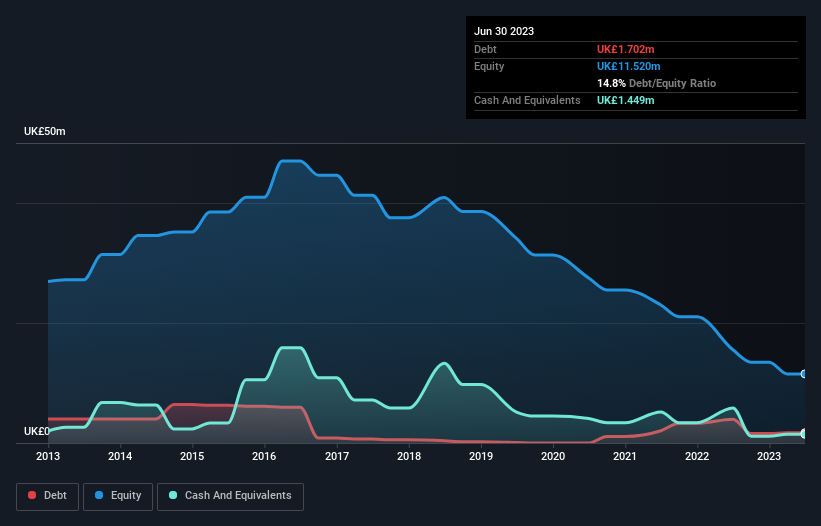The external fund manager backed by Berkshire Hathaway's Charlie Munger, Li Lu, makes no bones about it when he says 'The biggest investment risk is not the volatility of prices, but whether you will suffer a permanent loss of capital.' So it might be obvious that you need to consider debt, when you think about how risky any given stock is, because too much debt can sink a company. We can see that Plexus Holdings plc (LON:POS) does use debt in its business. But the real question is whether this debt is making the company risky.
Why Does Debt Bring Risk?
Generally speaking, debt only becomes a real problem when a company can't easily pay it off, either by raising capital or with its own cash flow. Ultimately, if the company can't fulfill its legal obligations to repay debt, shareholders could walk away with nothing. However, a more usual (but still expensive) situation is where a company must dilute shareholders at a cheap share price simply to get debt under control. Having said that, the most common situation is where a company manages its debt reasonably well - and to its own advantage. When we think about a company's use of debt, we first look at cash and debt together.
See our latest analysis for Plexus Holdings
What Is Plexus Holdings's Net Debt?
The image below, which you can click on for greater detail, shows that Plexus Holdings had debt of UK£1.70m at the end of June 2023, a reduction from UK£3.96m over a year. However, it does have UK£1.45m in cash offsetting this, leading to net debt of about UK£253.0k.

How Strong Is Plexus Holdings' Balance Sheet?
According to the last reported balance sheet, Plexus Holdings had liabilities of UK£4.98m due within 12 months, and liabilities of UK£2.13m due beyond 12 months. Offsetting this, it had UK£1.45m in cash and UK£2.47m in receivables that were due within 12 months. So its liabilities total UK£3.19m more than the combination of its cash and short-term receivables.
Since publicly traded Plexus Holdings shares are worth a total of UK£20.1m, it seems unlikely that this level of liabilities would be a major threat. However, we do think it is worth keeping an eye on its balance sheet strength, as it may change over time. But either way, Plexus Holdings has virtually no net debt, so it's fair to say it does not have a heavy debt load! When analysing debt levels, the balance sheet is the obvious place to start. But ultimately the future profitability of the business will decide if Plexus Holdings can strengthen its balance sheet over time. So if you're focused on the future you can check out this free report showing analyst profit forecasts.
Over 12 months, Plexus Holdings made a loss at the EBIT level, and saw its revenue drop to UK£1.5m, which is a fall of 36%. That makes us nervous, to say the least.
Caveat Emptor
Not only did Plexus Holdings's revenue slip over the last twelve months, but it also produced negative earnings before interest and tax (EBIT). Indeed, it lost a very considerable UK£4.3m at the EBIT level. When we look at that and recall the liabilities on its balance sheet, relative to cash, it seems unwise to us for the company to have any debt. So we think its balance sheet is a little strained, though not beyond repair. Another cause for caution is that is bled UK£2.8m in negative free cash flow over the last twelve months. So in short it's a really risky stock. There's no doubt that we learn most about debt from the balance sheet. However, not all investment risk resides within the balance sheet - far from it. We've identified 6 warning signs with Plexus Holdings (at least 2 which make us uncomfortable) , and understanding them should be part of your investment process.
If, after all that, you're more interested in a fast growing company with a rock-solid balance sheet, then check out our list of net cash growth stocks without delay.
New: Manage All Your Stock Portfolios in One Place
We've created the ultimate portfolio companion for stock investors, and it's free.
• Connect an unlimited number of Portfolios and see your total in one currency
• Be alerted to new Warning Signs or Risks via email or mobile
• Track the Fair Value of your stocks
Have feedback on this article? Concerned about the content? Get in touch with us directly. Alternatively, email editorial-team (at) simplywallst.com.
This article by Simply Wall St is general in nature. We provide commentary based on historical data and analyst forecasts only using an unbiased methodology and our articles are not intended to be financial advice. It does not constitute a recommendation to buy or sell any stock, and does not take account of your objectives, or your financial situation. We aim to bring you long-term focused analysis driven by fundamental data. Note that our analysis may not factor in the latest price-sensitive company announcements or qualitative material. Simply Wall St has no position in any stocks mentioned.
About AIM:POS
Plexus Holdings
Provides equipment and services for the oil and gas drilling industry in the United Kingdom, the United States, and internationally.
Reasonable growth potential with mediocre balance sheet.
Market Insights
Community Narratives



